Języki obce online.

Rozprawka typu opinion essay po angielsku
Rozprawka typu opinion essay po angielsku to druga forma wypowiedzi pisemnej w postaci rozprawki obowiązująca na maturze rozszerzonej z języka angielskiego. Inaczej niż w przypadku typowej rozprawki, w rozprawce typu opinion essay autor nie rozważa argumentów za i przeciw, lecz próbuje przekonać czytelnika do swojego punktu widzenia za pomocą silnych argumentów. Poniżej znajdziecie wskazówki jak napisać rozprawkę typu opinion essay po angielsku, przydatne zwroty oraz wzór rozprawki opinion essay po angielsku. Zobacz również: Rozprawka po angielsku za i przeciw .
Zasady pisania rozprawki typu opinion essay po angielsku
Pisząc rozprawkę, w której przedstawiamy własną opinię należy stosować się do zasad poprawnej gramatyki, a nawet wprowadzić bardziej zaawansowane konstrukcje gramatyczne. Trzeba również mieć na uwadze rodzaj stylu. W tym wypadku obowiązuje styl formalny. Rozprawka powinna być podzielona na akapity. Limit słów to 200-250.
Elementy składające się na rozprawkę typu opinion essay po angielsku
1. Wstęp – wprowadzenie tematu, podanie tezy z własną opinią .
Although zoos are very popular attractions for adults and children alike, they are very controversial. Many people argue that such places are useless and animals suffer physically and mentally. In my opinion , even though zoos are not perfect, they do have useful functions.
2. Rozwinięcie – realizacja tematu, podanie przykładów, szczegółowe omówienie argumentów.
Prezentacja własnej opinii z co najmniej dwoma argumentami/przykładami, potwierdzenie tezy.
Firstly, zoos are places of education because they help children appreciate nature. Also, thanks to research in zoos people know more about zoology, genetics and even psychology.
Secondly, zoos can protect the future of many animal species. Species that are in danger of extinction, may breed in zoos so that many animals have a chance of survival.
Przedstawienie jednego lub dwóch kontrargumentów oraz odmiennego stanowiska.
Critics of zoos say that such places are cruel. They think so because, in their opinion, zoos cannot recreate the environment in which animals live. That makes animals depressed and bored. What is more, animals have frequent contact with visitors who come to zoos and this may be stressful for them.
3. Zakończenie – podsumowanie zgodne z tematem i treścią wypowiedzi i/lub sformułowana inaczej własna opinia.
Although zoos are not perfect places for animals, I think that they have more pros than cons. As long as people hunt animals and destroy their environment, zoos are very useful.
Przydatne zwroty
In my opinion/view… – Moi zdaniem…
It is my own opinion that… – To moja własna opinia, że…
I am of the opinion that… – Jestem zdania, że…
As far as I’m concerned … – Z tego co mi wiadomo …
As far as I’m concerned … – Jeśli o mnie chodzi …
It seems to me that … – Wydaje mi się, że …
It occurs to me that … – Wydaje mi się, żę …
I reckon that … – Uważam, że …
I am positive that … – Jestem pewien, że …
There is no doubt that … – Nie ma wątpliwości, że …
I am convinced that … – Jestem przekonany, że …
I strongly believe that … – Zdecydowanie uważam, że …
I have nothing against … – Nie mam nic przeciwko …
I don’t mind … – Nie mam nic przeciwko …
I am not opposed to … – Nie jestem przeciwnikiem …
I don’t see any problem/issue with … – Nie widzę żadnego problemu w …
I don’t think it’s right to … – Nie wydaje mi się że … jest w porządku.
On one hand …, but on the other hand … – Z jednej strony …, ale z drugiej, …
I don’t really have any strong opinions about … – Właciwie nie mam jednoznacznej opinii na temat …
I really don’t know what to think about it. – Naprawdę nie wiem co o tym myśleć.
I have mixed feelings about … – Mam mieszane uczucia co do …
Firstly – Po pierwsze
First of all – Po pierwsze
To begin/start with – Poczynając od
The main reason is … – Głównym powodem jest …
Secondly – Po drugie
Thirdly – Po trzecie
The first/One/Another advantage of… is… – Pierwszą/Jedną/Inną zaletą… jest…
The first/One/Another disadvantage of… is… – Pierwszą/Jedną/Inną wadą… jest…
Many/Most/Some people claim that… – Wiele/Większość/Niektórzy ludzie twierdzą, że…
Many/Most/Some people think that… – Wiele/Większość/Niektórzy ludzie myślą, że…
Moreover/What is more/Furthermore – Co więcej
And on top of that … – A na dodatek …
Apart from … – Oprócz …
Last, but not least – Ostatni lecz nie mniej ważny
It’s also true that … – Prawdą jest również to że …
And finally, … – I w końcu …
Ultimately, … – Ostatecznie …
For example/For instance – Na przykład
Look at the case of … – Proszę spojrzeć na przypadek …
Look at the example of … – Proszę spojrzeć na przykład …
Let’s consider the case of … – Zastanówmy się nad/rozważmy przypadek …
Let’s consider the example of … – Zastanówmy się nad/rozważmy przykład …
One example of this is … – Jednym przykładem może być …
We can’t deny that … – Nie możemy zaprzeczyć, że …
A brilliant example of … is … – Świetnym przykładem … jest …
I can’t think of a better example of … than … – Nie mogę podać lepszego przykładu na … niż …
One point of view in favour of… – Jednym z punktów widzenia popierającym…
One point of view against… – Jednym z puntów widzenia przeciwko…
Opponents of… could argue that… – Przeciwnicy… mogliby temu zaprzeczać…
Advocates of… could say that… – Obrońcy… mogliby powiedzieć, że…
Especially – Zwłaszcza
Finally/Lastly – Na koniec
Last but not least – Ostatni, ale nie mniej ważny
In short, … – W skrócie, …
To put it short, … – Krótko mówiąc, …
So what it comes down to is … – A więc sprowadza się to do …
Taking everything into account/consideration … – Biorąc to wszystko pod uwagę …
In conclusion/Summing up/All in all/To sum up/To conclude – Podsumowując
All things considered…/ Overall, … – Ogólnie rzecz biorąc
To wrap up, … – Zbierając wszystko w całość, …
In other words, … – Innymi słowy, …
To reiterate, … – W celu powtórzenia, …
Rozprawka opinion essay po angielsku – wzór
Przykład rozprawki typu opinion essay po angielsku z tłumaczeniem, tłumaczenie:.

To już wszystko co musisz wiedzieć o tym, jak napisać rozprawkę typu opinion essay po angielsku. Jeśli artykuł okazał się przydatny, kliknij przycisk „Lubię to!” 🙂
Zobacz także:

4 komentarze
Zasadniczo w opinion essay argumenty zgodne z moją opinią powinny być rozdzielone przynajmniej na dwa akapity – a przynajmniej ja się tak uczyłam i tak mówi większość źródeł…
Tak, jeśli planujesz w rozprawce umieścić 2 argumenty za i jeden przeciw, można każdy z nich umieścić w oddzielnym akapicie 😉
skróty nie powinny się tu pojawiać.
A gdzie są skróty, bo nie widzę?
Odpowiedz Anuluj pisanie odpowiedzi
Twój adres e-mail nie zostanie opublikowany. Wymagane pola są oznaczone *
Komentarz *
Witryna internetowa
Zapisz moje dane, adres e-mail i witrynę w przeglądarce aby wypełnić dane podczas pisania kolejnych komentarzy.
Czym jest opinion essay i jak go napisać?

Opinion essay to jedna z bardzo często pojawiających się form pisemnych na egzaminach i szkolnych sprawdzianach. W odróżnieniu od klasycznej rozprawki nie próbujemy w niej niczego porównywać. Tego typu esej wymaga od uczniów zapisania swoich przemyśleń na dany temat. Ale jak zrobić to prawidłowo? Sprawdź nasz przewodnik!
Czym jest opinion essay?
Esej można porównać do rozprawki, tyle że przedstawiającej opinię autora. W tej pracy pisemnej uczeń prezentuje własny punkt widzenia, popierając go odpowiednimi przykładami i wyjaśnieniami. Przed rozpoczęciem pisania opinion essay dobrze jest zapoznać się z jego strukturą i wymaganiami, które powinien spełniać.
Jakie cechy powinien mieć dobrze napisany opinion essay ?
Trzymaj się tematu: Zawsze skupiaj się na odpowiedzi na zadane pytanie i nie odbiegaj od głównej kwestii, którą opisujesz. Dygresje i „lanie wody” nie są dobrze oceniane przez nauczycieli i egzaminatorów. Lepiej napisać nieco mniej, ale zawrzeć w wypowiedzi najważniejsze punkty.
Dobrze przemyślana teza: Zastanów się, jakiego założenia zamierzasz bronić. Kiepsko postawiona teza może bowiem skomplikować pisanie całej pracy (np. może zabraknąć argumentów). Uwzględnij wszystkie informacje, jakie zamierzasz przekazać w rozwinięciu.
Używaj języka formalnego: Chociaż pisanie w sposób nieformalny nie jest niczym złym, warto posługiwać się formalnymi stwierdzeniami, które podniosą rangę i wydźwięk Twojego wypracowania.
Unikaj slangu internetowego: W eseju opiniotwórczym, jak i każdej innej formie pisemnej, nie stosujemy slangu ani potocznych skrótów, którymi posługujemy się w komunikatorach czy rozmowach. Po pierwsze, nie każdy odbiorca może je zrozumieć. Po drugie, to nie miejsce na tego typu język.
Możesz użyć pierwszej osoby (opcjonalnie): Ze względu na osobiste przemyślenia, które będziesz opisywać w swojej pracy, dopuszczalne jest stosowanie pierwszej osoby liczby pojedynczej. Nie nadużywaj jej jednak.
Unikaj nieformalnej interpunkcji: nieformalna interpunkcja, taka jak wykrzykniki czy tworzone ze znaków specjalnych emotikony, zdecydowanie nie powinna pojawiać się w tego typu pracach. Pozostawmy ją do komunikacji z rówieśnikami.
Sprawdź stylistykę, gramatykę i interpunkcję: przed oddaniem pracy, najlepiej przeczytaj ją na głos i upewnij się, że szyk zdań, pisownia i gramatyka są zapisane poprawnie. Czasem przez drobne niedociągnięcia lub pomyłkę, możesz stracić sporo punktów, które obniżą Twoją końcową ocenę.
Struktura opinion essay
Standardowa struktura eseju składa się z trzech akapitów: wstępu, rozwinięcia i zakończenia. O ile pierwszy i ostatni mają za zadanie najpierw wprowadzić, a potem podsumować wypowiedź, o tyle w rozwinięciu powinny znaleźć się jeszcze przynajmniej trzy paragrafy potwierdzające postawioną na początku tezę. Ustalenie, co powinno znaleźć się w każdej sekcji może być trudne, zwłaszcza dla osób początkujących. Dlatego pisanie eseju warto rozpocząć od zarysowania planu, który krok po kroku poprowadzi nas przez całe wypracowanie.
Akapit wprowadzający jest rodzajem mapy drogowej opisującej ścieżkę, którą podąży Twój esej. Jego głównym celem jest przygotowanie czytelników do poruszanego tematu. Sekretem dobrego wstępu jest rzucenie czytelnikowi „haczyka”, który przyciągnie jego uwagę i sprawi, że przeczyta całość do samego końca, np. szukając odpowiedzi na nurtującą kwestię. Po takiej „zaczepce” (np. ciekawostce, cytacie, podchwytliwym pytaniu albo stwierdzeniu), przedstaw temat i krótko opisz powody, dla których warto zapoznać się z treścią tekstu.
- Rozwinięcie
Rozwinięcie to nic innego jak szersze opisanie najważniejszych założeń Twojej wypowiedzi w odniesieniu do postawionej tezy. Napisz minimum trzy paragrafy (ale najlepiej nie więcej niż pięć), aby logicznie i czytelnie wyjaśnić swój punkt widzenia.
Każdy z nich powinien mieć taki schemat:
- argument popierający tezę,
- przykład (z życia, filmu, polityki, sportu itp.)
- wyjaśnienie,
- zdanie łączące, nawiązujące do kolejnego akapitu (w przypadku ostatniego akapitu – do konkluzji).
- Zakończenie
W zakończeniu podsumowujemy cały artykuł (np. jeszcze raz, ale krótko wymieniając argumenty), wysuwamy wniosek oraz ostatecznie kończymy wypowiedź, używając np. sentencji lub słów jakiegoś utworu literackiego czy muzycznego).
Słówka, które warto wykorzystać w opinion essay
Kiedy opanowaliśmy już strukturę treści, warto przypomnieć sobie słówka i wyrażenia, które pomogą w napisaniu poprawnego stylistycznie i gramatycznie eseju. Poniżej znajdziesz listę najpopularniejszych z nich:
- I am (not) convinced that…
- My opinion is that…
- I (firmly) believe that…
- In my opinion/view…
- I (definitely) feel/think that…
- I am inclined to believe that…
- Personally, I believe that…
- It is clear that…
- As I see it…
- My principal reason is…
- It seems to me that…
- Another reason is… In my mind…
- It is widely known that…
- It could be argued that…
- It would seem that…
- This proves that…
- This supports the …
- Even though / Although…
- The well-known fact is…
- Research has shown that…
- For instance/for example…
- This suggests that…
- In contrast…
- Despite the fact that…
- In spite of…
- In order to…
- In conclusion…
Trzymamy kciuki za swobodne przelewanie myśli na papier! 🙂
Zdjęcie: Ivan Samkov | Pexels
Dodatkowy angielski, dlaczego warto dodać go do...
Food smart – smakowity projekt, angielski dla nastolatków – szybka nauka słówek..., growth mindset – jak może wpłynąć na..., angielski w domu — darmowe gry i..., co może rozpraszać dziecko podczas nauki, angielski dla najmłodszych: jak wprowadzić dziecko w..., czasy w języku angielskim – jak utrwalać,..., mindfulness z dzieckiem w domu, kurs języka angielskiego dla dzieci w wieku..., skomentuj cofnij.
Zapisz moje dane, adres e-mail i witrynę w przeglądarce aby wypełnić dane podczas pisania kolejnych komentarzy.
- Metoda Speak Up
- Kraków Mogliska
- Warszawa Mokotów

- kurs indywidualny
- kurs grupowy
- kurs w aplikacji C4E
- dla początkujacych
- dla średnio zaawansowanych
- dla zaawansowanych
- dla młodzieży
- dla studentów
- kursy dla dorosłych
- dla seniorów
- kurs konwersacyjny
- kursy intensywne
- kurs biznesowy
- kursy maturalne
- kursy dla ósmoklasistów
- O poziomach
- kursy grupowe
- kursy indywidualne
- B2 First (FCE )
- C1 Advanced (CAE)
- Szkoła online
- Materiały do pobrania
- Gramatyka j. angielskiego
- Ćwiczenia z angielskiego
- Bezpłatny test
- Strefa słuchacza
Rozprawka opiniująca - angielski opinion essay
Angielski opinion essay różni się jednak nieco od typowej rozprawki: to rodzaj pisemnej wypowiedzi na konkretny temat, której autor stara się przekonać odbiorcę (czytelnika) do przedstawionej własnej opinii przy pomocy rzeczowej, silnej argumentacji, przedstawiając jednocześnie kontrargumenty. Poniżej znajdziesz najważniejsze informacje o tym, jak pisać opinion essay , a także przydatne zwroty i wyrażenia, bez których nie może obyć się dobra rozprawka opiniująca. Angielski opinion essay naprawdę nie tak trudno napisać, zapraszamy zatem do lektury!
Rozprawka opinion essay - jak napisać?
Zanim zabierzesz się do faktycznego pisania, warto się do tej czynności odpowiednio przygotować. W jaki sposób? Otóż każda rozprawka opiniująca dotyczy konkretnego, jasno określonego tematu czy problemu, a zatem najlepiej jest wypisać sobie wszystkie argumenty "za" i "przeciw", jakie jesteś w stanie wymyślić w odniesieniu do tematu opinion essay . Angielski na tym etapie nie będzie jeszcze potrzebny - takie zestawienie najlepiej przygotować sobie po polsku.
Kiedy już masz rozpisane argumenty, dość łatwo będzie określić, po której "stronie" argumentacji łatwiej będzie się postawić jako autor rozprawki. Pamiętaj, że w opinion essay masz przedstawić argumentację potwierdzającą konkretny punkt widzenia, który wcale nie musi być tożsamy z twoją prywatną opinią na dany temat - to znacznie ułatwi napisanie poprawnej formalnie i treściowo rozprawki opiniującej.
Rozprawka typu opinion essay - budowa
Struktura rozprawki opiniującej musi być trójdzielna, tzn. obejmować wstęp, rozwinięcie i zakończenie, przy czym w rozwinięciu powinno się znaleźć miejsce na 3 akapity - 2 zawierające argumenty popierające opinię autora rozprawki i 1 z kontrargumentem. W praktyce zatem rozprawka opiniująca będzie mieć 5 części, które łącznie muszą zamknąć się w około 200-250 słowach. Dobrym pomysłem jest poświęcenie mniej więcej takiej samej objętości tekstu na każdy akapit i najlepiej właśnie w ten sposób pisać opinion essay .
Przyklad:
- wstęp - ok. 40 słów
- rozwinięcie - 3 akapity po ok. 50 słów
- zakończenie - ok. 40 słów
Rozprawka po angielsku opinion essay - zwroty
Aby precyzyjnie i klarownie wyrazić zdanie na konkretny temat w rozprawce opiniującej, konieczne jest posługiwanie się zwrotami o charakterze formalnym. Poniżej znajdziesz przykładowe wyrażenia do wykorzystania w poszczególnych częściach rozprawki.
Opinion essay - jak pisać wstęp?
We wstępie do rozprawki opiniującej muszą znaleźć się 2 elementy: jasno sprecyzowana teza oraz prezentacja opinii autora na ten temat. Można tu zastosować następujące zwroty:
- There has been a lot of discussion in the media about...
- Many people believe that...
- Nowadays, it seems that...
Własną opinię można wprowadzić np. tak:
- I firmly/strongly believe that...
- In my opinion...
- As I see it...
Rozprawka opiniująca - argumenty "za"
Ze względu na ograniczoną długość rozprawki opiniującej nie należy przesadzać z liczbą argumentów potwierdzających stanowisko autora - w zupełności wystarczą 2, ale mocne. Można je wprowadzić np. za pomocą następujących zwrotów:
- To start/begin with...
- The main advantage/benefit of...
- First of all...
- Secondly...
- In addition to that...
- Last but not least...
Opinion essay - przykłady argumentów "przeciw"
Podając w trzecim akapicie rozwinięcia kontrargument, warto zadbać o to, by był to najsilniejszy argument "przeciwko". Poniżej kilka przydatnych wyrażeń:
- The most important disadvantage/drawback of...
- The opponents of (...) claim that...
- Contrary to...
- On the other hand...
- As opposed to the above ideas...
Jak podsumować angielski opinion essay ?
W podsumowaniu należy podsumować argumentację (najlepiej zwięźle) oraz ponownie zawrzeć własną opinię autora rozprawki, jednak sformułowaną w nieco inny sposób niż we wstępie. Przydatne będą tu następujące zwroty:
- To conclude...
- All things considered...
- Taking everything into account...
- I fully support the idea that...
- As far as I am concerned...
Opinion essay - przykład
Jako podsumowanie zamieszczamy poniżej przykładowy opinion essay , stworzony zgodnie z opisanymi zasadami.
E-mail letters are better and more convenient than traditional letters - true or false?
Nowadays e-mails have largely replaced traditional letters and postcards, leading to the disappearance of traditional (paper) correspondence in favor of electronic forms of communication. I am convinced that e-mails are more convenient and efficient than writing paper letters.
The main advantage of writing e-mail letters is the fact that it is significantly less time-consuming, because it is extremely easy to make necessary corrections, you can also automatically check spelling and grammar, not to mention the fact that every e-mail can be sent to many people simultaneously.
Additionally, the information reaches all the recipients within a few seconds, while a traditional letter could take days, weeks or even months to reach the recipient, not to mention the fact that sending an e-mail is significantly cheaper than sending a letter - especially in case of sending a letter to someone living abroad.
On the other hand, traditional letters have that unique, tangible physical presence, which can hold attention of a recipient for much longer than an e-mail. As a result, many people keep letters for a long time as mementos.
Summing up, in my opinion, electronic mail is a faster and more practical alternative to traditional letters which is a very important factor to consider in the modern world, where we rarely can spend much time on something.
Zachęcamy do jak najczęstszego odwiedzania naszego bloga, na którym publikujemy wiele ciekawych, przydatnych materiałów, dzięki którym nauka angielskiego będzie łatwiejsza i przyjemniejsza!
Zachęcamy do zapoznania się również z rozprawką za i przeciw po angielsku .
Dzisiejszy wpis na naszym blogu może okazać się szczególnie przydatny dla tych maturzystów, którzy zdecydowali się na pisemny egzamin maturalny z języka angielskiego w wersji rozszerzonej, a także dla wszystkich osób chcących zdawać jeden z egzaminów językowych Cambridge (np. FCE czy CAE). Dlaczego? Jak powszechnie wiadomo, na rozszerzonej maturze z języka angielskiego mogą pojawić się różne formy wypowiedzi pisemnej, a jedną z nich jest właśnie rozprawka.
Wyszukiwarka wpisów

Przygotuj fiszki do angielskiego dopasowane do swoich potrzeb

Przedrostki i przyrostki w języku angielskim

Jak opisać wykresy, grafiki i diagramy w prezentacji w języku angielskim?

Odchudzanie i diety po angielsku
*Wysyłając powyższe zgłoszenie akceptujesz zgodę na przetwarzenie danych osobowych w celach marketingowych oraz zgodę na przesyłanie informacji handlowych drogą eleketroniczną
Kursy Angielskiego
- Dla początkujących
- Dla średnio zaawansowanych
- Dla zaawansowanych
- Indywidualne
- Kursy intensywne
- Kursy on-line
- Kursy biznesowe
- Kurs konwersacyjny
- Kursy maturalne
- Kursy dla firm
- Dla ośmioklasistów
- Dla młodzieży
- Dla studentów
- Dla dorosłych
- Dla seniorów
Świat Speak up
- Regulamin zawierania umowy na odległość
- Wzór oświadczenia o odstąpieniu od umowy
- 695 213 867
Godziny otwarcia
- Pon-pt. 9:00 - 17:00
- [email protected]
- Dostępne formy płatności
Speak Up Partner
- Zostań partnerem biznesowym
Bezpłatna lekcja
Umów bezpłatną lekcję
- Opinion essay — przykładowy tekst
It is argued that teaching art at school is a waste of time and funding that could be spent elsewhere. I strongly disagree with that statement. I believe that creativity is essential to our survival, and exposing children to art from an early age can help them cope with problems in adult life.
Various studies have proven that art stimulates our brain and improves our memory. Children who learn about art are better at problem-solving and critical thinking, and such skills are invaluable not only in school but also in life in general.
Moreover, we cannot forget about the power of imagination and emotional expression. A lot of adults do not know how to cope with their feelings or how to communicate them. Art not only provides a safe space that we can escape to in times of trouble, but also gives us tools to understand life.
In addition to this, I don’t think anyone could imagine our existence without art, music or literature. Art helps us navigate through life and enjoy it a bit more at the same time.
To sum up, educating our children about art is one of the most important things we can do for their all-round development.
- Opinion essay — wyrażenia
- In my opinion/view…- Moim zdaniem…
- I personally feel that…- Osobiście czuję, że…
- I firmly believe that… - Mocno wierzę, że…
- I partially/fully agree/disagree that…- Częściowo/w pełni zgadzam się/nie zgadzam się, że…
- I think…- Myslę…
- I believe…- Wierzę…
- It is widely known that…- Powszechnie wiadomo, że…
- It is a well-known fact that…- Powszechnie wiadomo, że…
- Research has shown that…- Badania wykazały, że…
- It is a fact that…- To fakt że…
- Another reason why…- Kolejny powód, dla którego…
- In addition to this, …- Ponadto…, W dodatku…
- Moreover, …- Ponadto, …
- Furthermore, …- Co więcej, ponadto
- What is more, …- Co więcej, ponadto
- However, …- Jednak, jednakże
- Although…- Chociaż
- On the other hand…- Z drugiej strony…
- Despite…- Mimo…
- In spite of…-Mimo…
- Whereas…- Natomiast…
- Firstly/Secondly/Thirdly…- Po pierwsze/Po drugie/Po trzecie…
- Finally…- W końcu, wreszcie…
- In conclusion…- Podsumowując…
- To sum up…- Podsumowując…
- To conclude…- Podsumowując…
Na koniec zapraszamy na video podsumowujące:
Opinion essay — rozprawka opiniująca po angielsku
Pisząc opinion essay Twoim zadaniem jest przedstawić swoją opinię na jakiś temat i poprzeć ją przykładami i argumentami. Zanim zabierzesz się do pisania, warto poznać dokładnie zasady i strukturę takiej rozprawki.
Poniższy artykuł przyda się każdemu, kto planuje zdawać jeden z egzaminów Cambridge, IELTS czy maturę rozszerzoną z angielskiego.
Spis treści
Opinion essay vs for and against essay
O czym pamiętać pisząc opinion essay, opinion essay — schemat.
Rozprawka for and against (czyli za i przeciw) polega na przedstawieniu argumentów za i przeciw na zadany temat bez wyrażania własnej opinii. W rozwinięciu warto przedstawić dwa lub trzy argumenty za i przeciw i poprzeć je przykładami. Dopiero na koniec, po podsumowaniu tematu, możemy wspomnieć o naszej osobistej opinii.
Opinion essay , czyli rozprawka z opinią, opiera się na naszej osobistej opinii, którą nakreślamy już na samym początku. Skupiamy się na przekonaniu czytelnika do naszej tezy. Możemy odwołać się do kontrargumentów, ale nie jest to konieczne.
Pamiętaj o odpowiednim stylu (pół-formalny). Staraj się używać zaawansowane konstrukcje gramatyczne i słownictwo. Nie używaj skrótów czy wyrażeń potocznych.
Już na samym początku postaw swoją tezę i nie zmieniaj jej. Nie ważne jest czy naprawdę tak uważasz. Wybierz stronę argumentu, którą jesteś w stanie poprzeć lepszymi argumentami.
Najlepiej, żeby Twoja rozprawka składała się z 4-5 akapitów. Zazwyczaj wymagane jest około 250 słów. Rozprawka powinna składać się ze wstępu, w którym stawiamy tezę, rozwinięcia (2-3 akapitów) i zakończenia.
Zanim zaczniesz pisać tekst, zapisz sobie 2-3 argumenty, które rozwiniesz i zanotuj przydatne słownictwo.
Sprawdź również: Jak napisać email po angielsku?
Poniższy schemat jest tylko jedną z możliwości, jakie możesz wykorzystać w trakcie pracy nad rozprawką z opinią. W rozwinięciu możesz nawiązać do jakiegoś kontrargumentu, aby w taki sposób jeszcze mocniej zaznaczyć swoje zdanie.
- Sparafrazuj pytanie lub zacytuj znaną osobę, wiersz, książkę w nawiązaniu do tematu
- Postaw swoją tezę
- Przedstaw dwa elementy Twojej opinii, które rozwiniesz dalej
- Nakreśl pierwszy argument
- Wyjaśnij/rozwiń myśl
- Podaj przykład
- Nakreśl drugi argument
- Nakreśl trzeci argument
- Podsumuj swoją opinię
Autor Joanna Leporowska
Absolwentka Filologii Nowogreckiej na UAM w Poznaniu, tłumaczka angielskiego, poliglotka i pasjonatka językoznawstwa. Już w przedszkolu zdecydowała, że musi "mówić jak Anglik" co przydało się, gdy przez ostatnie dziesięć zatrzymał ją wymarzony Londyn i praca dla Royal Academy of Arts czy Tate. Nauczanie języka angielskiego to pasja, w której od zawsze dąży przede wszystkim do pokazania żywego języka za regułkami książkowymi, czego w szkolnej edukacji często brakuje.
Najnowsze posty
© Copyright 2024 by Chatschool

Teacher Habits
Helping Teachers inside the Classroom and Out
How to Write an Opinion Essay (With Tips and Examples)
Are you struggling with how to write an opinion essay that effectively communicates your viewpoint on a particular topic while providing strong evidence to back it up? Fear not! In this comprehensive guide, we will walk you through the process of crafting a quality opinion essay, from understanding the purpose and structure to choosing engaging topics and employing effective writing techniques. Let’s dive in!
Table of Contents
Key Takeaways
- Opinion essays are formal pieces of writing that express the author’s viewpoint on a given subject.
- Crafting an effective thesis statement and outline, choosing engaging topics, using formal language and tone, addressing counterarguments and maintaining logical flow are essential for creating compelling opinion essays.
- The revision process is key to producing polished opinion essays that effectively convey one’s opinions.
What is an Opinion Essay?
An opinion essay, also known as an opinion paper, is a formal piece of writing wherein the author expresses their viewpoint on a given subject and provides factual and anecdotal evidence to substantiate their opinion. The purpose of an opinion essay is to articulate a position in a clear and informative manner, following a proper opinion essay structure. Opinion essays are commonly found in newspapers and social media, allowing individuals to articulate their perspectives and opinions on a specific topic, striving to create a perfect opinion essay.
While the focus of an opinion essay should be on the writer’s own opinion concerning the issue, it necessitates more meticulous planning and effort than simply articulating one’s own thoughts on a particular topic. The arguments in an opinion essay should be grounded on well-researched data, making it crucial to consult pertinent information, including the definition, topics, opinion writing examples, and requirements, to write an opinion essay and transform novice writers into proficient writers.
Crafting the Perfect Thesis Statement
A strong thesis statement is the foundation of a great essay. It clearly expresses the writer’s opinion and sets the stage for the rest of the essay. To craft the perfect thesis statement, start by perusing the essay prompt multiple times to ensure you fully understand the question or topic you are being asked to discuss. Once you have a clear understanding of the topic, construct your opinion and conduct thorough research to locate evidence to corroborate your stance and examine counterarguments or contrasting perspectives.
Remember, your thesis statement should provide a succinct overview of the opinion essay and serve as a guide for the remainder of the paper. By crafting a strong thesis statement, you will be able to capture your reader’s attention and set the tone for a well-structured and persuasive essay.
Building a Solid Opinion Essay Outline
A well-structured opinion essay format is crucial for organizing your thoughts and ensuring that your entire essay flows smoothly from one point to the next. An opinion essay outline typically comprises an introduction, body paragraphs, and a conclusion, following the standard five-paragraph essay structure.
Let’s delve deeper into each component of the outline. The introduction should provide a brief overview of the topic and your opinion on it. It should be.
Introduction
The introduction of your opinion essay should hook the reader and provide an overview of the essay’s content. To achieve this, consider addressing the reader directly, introducing a quotation, posing thought-provoking or rhetorical questions, or referring to a remarkable or unconventional fact, concept, or scenario.
It is essential to introduce the topic clearly in the introduction to avoid superfluous phrases and inapplicable facts that are not pertinent to the topic. By crafting an engaging introduction, you will set the stage for a compelling and well-organized opinion essay.
Body Paragraphs
The body paragraphs of your good opinion essay should provide arguments and supporting examples to substantiate your opinion. Begin each paragraph with a distinct topic sentence and use credible sources to provide substantiation for your viewpoint with dependable data.
Addressing counterarguments in your body paragraphs can also enhance your essay by illustrating a comprehensive understanding of the subject matter and fortifying your stance.
Organize your body paragraphs in a coherent manner, ensuring that each argument and supporting example flows logically from one to the next. This will make it easier for your reader to follow your train of thought and strengthen the overall impact of your essay.
The conclusion of your opinion essay should summarize the main points and restate your opinion in a new manner, providing a sense of closure and completion to your argument. Keep your conclusion concise and avoid introducing new information or arguments at this stage. By effectively summarizing your main points and restating your opinion, you will leave a lasting impression on your reader and demonstrate the strength of your argument.
In addition to summarizing your main ideas, consider providing a final thought or call to action that will leave your reader pondering the implications of your essay. This can further reinforce the impact of your conclusion and leave a lasting impression on your reader.
Choosing Engaging Opinion Essay Topics
Selecting engaging topics for opinion essays is crucial for capturing the reader’s interest and encouraging critical thinking. While there are an abundance of potential questions or topics that could be utilized for an opinion essay, it is important to choose topics that are relevant, interesting, and thought-provoking.
To find inspiration for engaging opinion essay topics, consider browsing the Op-Ed sections of newspapers, exploring social media debates, or even reflecting on your own experiences and interests. Keep in mind that a well-chosen topic not only draws the reader’s attention, but also stimulates critical thinking and fosters insightful discussions.
Opinion Essay Writing Techniques
Effective opinion essay writing techniques include using formal language and tone, addressing counterarguments, and maintaining logical flow.
Let’s explore each of these techniques in more detail.
Formal Language and Tone
Using formal language and tone in your opinion essay is essential for conveying a sense of professionalism and credibility. This can be achieved by avoiding slang, jargon, and colloquial expressions, as well as short forms and over-generalizations. Moreover, expressing your opinion without utilizing the personal pronoun “I” can give your essay a seemingly more objective approach.
Remember that the recommended tense for composing an opinion essay is present tense. By maintaining a formal language and tone throughout your essay, you will demonstrate your expertise on the subject matter and instill confidence in your reader.
Addressing Counterarguments
Addressing counterarguments in your opinion essay is an effective way to demonstrate a well-rounded understanding of the topic and strengthen your position. To do this, introduce opposing viewpoints in a straightforward manner and provide evidence to counter them. This not only showcases your comprehension of the subject matter, but also bolsters your own argument by refuting potential objections.
By acknowledging and addressing counterarguments, you will create a more balanced and persuasive opinion essay that encourages critical thinking and engages your reader.
Maintaining Logical Flow
Ensuring your opinion essay maintains a logical flow is critical for enabling your reader to follow your arguments and evidence with ease. To achieve this, utilize precise and succinct words, compose legible sentences, and construct well-structured paragraphs. Incorporating transitional words and varied sentence structures can also enhance the flow of your essay.
By maintaining a logical flow throughout your opinion essay, you will create an organized and coherent piece of writing that effectively communicates your viewpoint and supporting arguments to your reader.
Analyzing Opinion Essay Examples
Analyzing opinion essay examples can help improve your understanding of the structure and style required for this type of writing. Numerous examples are available online as a source of reference, providing valuable insights into how other writers have approached similar topics and structured their essays.
By examining opinion essay examples, you will be better equipped to identify the elements of a successful essay and apply them to your own writing. This will not only enhance your understanding of opinion essay writing, but also inspire you to develop your own unique voice and style.
The Revision Process: Polishing Your Opinion Essay
The revision process is essential for polishing your opinion essay, ensuring clarity, logical flow, and proper grammar and punctuation. Start by rereading your first draft, making improvements as you progress and rectifying any grammar errors that may be observed. Having another individual review your writing, such as a family member or friend, can provide candid feedback, allowing you to refine your essay further.
The ultimate step in composing an opinion essay is proofreading. This final review will ensure that your essay is polished and free from errors, resulting in a well-crafted and persuasive piece of writing that effectively communicates your opinion on the topic at hand.
Frequently Asked Questions
How do you start an opinion essay.
To start an opinion essay, begin by stating the subject of your essay and expressing your perspective on it. Follow up by using an interesting or provocative statement to capture the reader’s attention.
Introduce your essay by restating the question in your own words, making sure to make your opinion clear throughout your essay.
What is the structure of an opinion essay?
An opinion essay is typically structured with an introduction containing a thesis statement, body paragraphs providing arguments or reasons that support your view, and a conclusion.
Each section of the essay should be written in a formal tone to ensure clarity and effectiveness.
What is the format of an opinion paragraph?
An opinion paragraph typically begins with a clear statement of the opinion, followed by body sentences providing evidence and support for the opinion, before finally summarizing or restating the opinion in a concluding sentence.
It should be written in a formal tone.
What not to write in an opinion essay?
When writing an opinion essay, make sure to stay on topic, avoid slang and jargon, introduce the topic clearly and concisely, and do not include unnecessary facts that do not relate directly to the question.
Use a formal tone and keep your conclusion clear in the first sentence.
What is the purpose of an opinion essay?
The purpose of an opinion essay is to articulate a position in a clear and informative manner, providing evidence to support it.
This type of essay requires the writer to research the topic thoroughly and present their opinion in a logical and convincing way. They must also be able to back up their opinion with facts and evidence.
In conclusion, crafting a quality opinion essay requires a clear understanding of the purpose and structure of this type of writing, as well as the ability to choose engaging topics and employ effective writing techniques. By following the guidelines and tips provided in this guide, you will be well on your way to creating a compelling and persuasive opinion essay that effectively articulates your viewpoint and supporting arguments.
Remember, practice makes perfect. The more you write and revise, the more adept you will become at crafting insightful and impactful opinion essays. So, go forth and share your opinions with the world, backed by strong evidence and persuasive writing!
Rozprawka typu opinion essay
Na egzaminie maturalnym mogą pojawić się dwa rodzaje rozprawki: for and against oraz opinion essay. Dziś przedstawię wam zasady, strukturę i wyrażenia przydatne przy pisaniu rozprawki typu opinion essay.
Ale na początek – czym one właściwie się różnią?
Jak już wspomniałam, dziś zabieramy się za opinion essay. Cały opis procesu pisania tego typu rozprawki będę opierać na temacie: Czy jesteś za czy przeciwko karze śmierci?
Krok 1 Przeanalizuj argumenty
Przede wszystkim, wypisz sobie wszystkie argumenty za i przeciw, i zobacz które argumenty są mocniejsze, które przeważają. Jest to bardzo pomocne w dwóch sytuacjach:
1) Kiedy tak naprawdę nie masz zdania na dany temat
2) Kiedy np. twoim jedynym argumentem jest wiara w to, że coś jest dobre. (np. Eutanazja – wiele osób jest przeciwko, jednakże logicznych argumentów więcej jest za)
Kiedy widzisz które argumenty przeważają, nie unoś się ambicją – niestety egzaminy charakteryzuje to, że czasem lepiej jest napisać to, co jest nam łatwiej napisać, niż to, co byśmy chcieli.
Tak więc, mimo że nie jestem zwolenniczką kary śmierci, stwierdziłam że o wiele łatwiej na czas pisania pracy będzie mi się wczuć w jej zwolennika.
We wstępie, musisz wprowadzić temat i przedstawić swoją opinię. Jest to element, który sprawia najwięcej problemu przy pisaniu prac, dlatego zawsze polecam swoim uczniom wykorzystanie kilku sprawdzonych sposobów:
- zdefiniowania problemu, np: Capital punishment is a process, whereby a person is put to death by the state as punishment for a crime.
- zacytowanie myśli lub powiedzenia, np. Someone once said that more people would be alive today if there were a death penalty. This statement seems to be true especially nowadays, due to the number of crimes commited.
- postawienie pytania retorycznego, np. Can you imagine the world, where everyone would be afraid of commiting a crime due to the punishment of death penalty?
- sformułowanie ogólnego osądu, powszechnie znanego, np. Nowadays, many people claim that the capital punishment should be forbidden.
Oczywiście sposoby te można ze sobą łączyć, żeby stworzyć całkiem zgrabny wstęp, np:
Can you imagine the world, where everyone would be afraid of commiting a crime due to the punishment of death penalty? Capital punishment is a process, whereby a person is put to death by the state as punishment for a crime. Nowadays, many people claim that the capital punishment should be forbidden.
3. Postawienie tezy.
W tezie, musimy stwierdzić, co sądzimy na dany temat – czy się z nim zgadzamy, czy nie. W moim przypadku, będzie to: I am fully convinced that capital punishment should be legal in certain cases. Zdanie to, będzie ostatnim zdaniem mojego wstępu.
Kilka wyrażeń przydatnych do wyrażenia swojej opinii (możecie je również wykorzystać w dalszej części rozprawki):
3. Rozwinięcie
Rozwinięcie zwykle składa się z trzech akapitów:
Pamiętaj, żeby wszystkie trzy akapity zajmowały objętościowo mniej więcej tyle samo miejsca!
Od czego rozpocząć akapit? Każdy akapit rozpoczynamy od tzw. topic statement. Topic statement powinno podsumowywać to, co znajdzie się w danym akapicie. Innymi słowy, żeby ktoś, kto przeczyta pierwsze zdanie, wiedział o czym będzie cały akapit.
W moim przypadku, uznałam że najsilniejszym argumentem jest kwestia ekonomiczna, dlatego też zacznę akapit stwierdzeniem: To begin with, keeping serious criminals in prisons for many years is not economical. Każdy, kto przeczyta to zdanie będzie wiedział, że za chwilę pojawi się seria uzasadnień, dlaczego tak jest.
Kolejnym krokiem, jest znalezienie dwóch lub trzech przykładów, które pozwolą nam na uzasadnienie naszej tezy. Uznałam, że kara śmierci jest bardziej ekonomiczna, ponieważ:
- Więźniowie siedząc przez 25 lat potrzebują wyżywienia, straży i opieki. Jeśli zostaną poddani karze śmierci – kraj i podatnicy sporo zaoszczędzą.
- Dlaczego rodzina osoby zamordowanej przez kryminalistę, ma pośrednio (poprzez płacenie podatków) utrzymywać go do końca życia?
Podobnie zrób z drugim akapitem.
W trzecim, przytocz opinie strony przeciwnej, poprzedzając je odpowiednim zwrotem np: On the other hand, some people believe that the death penalty is not ethical. Następnie kontynuuj, jak w przypadku poprzednich akapitów. Możesz zakończyć ten akapit czymś, co delikatnie podważy zasadność tych argumentów, np: However, is it better to punish one person with a death penalty or to sentence many innocent people to death by letting a murderer out after twenty-five years?
Aby wprowadzać kolejne argumenty, przytaczać przykłady, przyczyny czy też skutki przyda nam się kilka kolejnych wyrażeń:
4. Podsumowanie
W podsumowaniu, należy ponownie przedstawić swoją opinię na temat omawianych kwestii. W jednym zdaniu, możesz w skrócie wymienić wspomniane wszystkie argumenty, np. Taking into consideration all the economical, safety and ethical factors, I strongly believe that the capital punishment should be legal in case of serious crimes.
Zdanie to, możesz poprzedzić jakimś ogólnym stwierdzeniem, typu: Death penalty has always been the matter of concern, and it will probably be forever.
Przydatne będą wam zwroty takie jak:
O czym pamiętać?
- Pamiętaj, aby zachować układ pięciu akapitów – wstęp, rozwinięcie (3 akapity), zakończenie.
- Pamiętaj o ograniczeniu – 200-250 słów.
- Postaraj się zastąpić pospolite wyrazy i wyrażenia, tymi bardziej wyszukanymi.
- Prześledź swoją pracę i sprawdź, czy użyłeś ciekawych struktur językowych, takich jak strona bierna, mowa zależna, inwersja, tryby warunkowe.
- Śledź na bieżąco wydarzenia na świecie – niewykluczone że któryś z bieżących problemów społecznych, stanie się tematem rozprawki na maturze.
Przykładowe tematy opinion essay:
1. W dzisiejszych czasach przyszłość należy wyłącznie do specjalistów w naukach ścisłych.
2. Rząd powinien respektować uczucia mniejszości religijnych.
3. Homoseksualni rodzice – szansa czy zagrożenie?
4. Przeprowadzanie testów na zwierzętach powinno być surowo zabronione..
5. Rodzice powinni kontrolować, z kim spotykają się ich dzieci.
Chcesz wiedzieć więcej? Może zainteresują Cię moje publikacje! Z okazji kwartantanny, wszystkie poniższe pdf-y tylko 10 PLN!:)

Może Cię zainteresować
Rozprawka typu for and against, wpis na blogu, wpis na blogu – zadania, dodaj komentarz anuluj pisanie odpowiedzi.
Witryna internetowa

© 2024 Angielski dla opornych
Search form
An opinion essay.
Look at the essay and do the exercises to improve your writing skills.
Instructions
Do the preparation exercise first. Then do the other exercises.
Preparation

Check your understanding: multiple selection
Check your writing: matching - useful words and phrases, worksheets and downloads.
Are video games really a good way to keep fit? What do you think?

Sign up to our newsletter for LearnEnglish Teens
We will process your data to send you our newsletter and updates based on your consent. You can unsubscribe at any time by clicking the "unsubscribe" link at the bottom of every email. Read our privacy policy for more information.

The Ultimate Guide to Opinion Writing for Students and Teachers
The Importance of Opinion Writing
Encouraging our students to express their personal opinions is an important part of the learning process; healthy even. To do this effectively, it is equally important that we help them acquire the necessary skills to express these opinions in a reasoned and coherent manner when teaching opinion writing.
Writing is one of the best possible vehicles for our students not only to express their opinions but to explore the strength and validity of those opinions.
CONSIDERATIONS BEFORE WRITING AN OPINION ESSAY
For our students to competently express their opinions in writing, they must first understand the specific requirements of the type of question they are answering. Of course, there are many types of questions and fun opinion writing prompts that are geared towards coaxing personal opinions from a student and each will require its own specific tailored response.
It’s clear that personal opinions permeate a wide range of genres and media. We find opinions everywhere from hotel reviews and infomercials to political commentary and newspaper editorials. But, despite the diversity of forms opinion writing can take, we can helpfully identify some general criteria that will assist our students in navigating the challenge of most opinion writing prompts and questions.
Let’s take a look at some of these criteria in more detail.
A COMPLETE UNIT FOR TEACHING OPINION WRITING
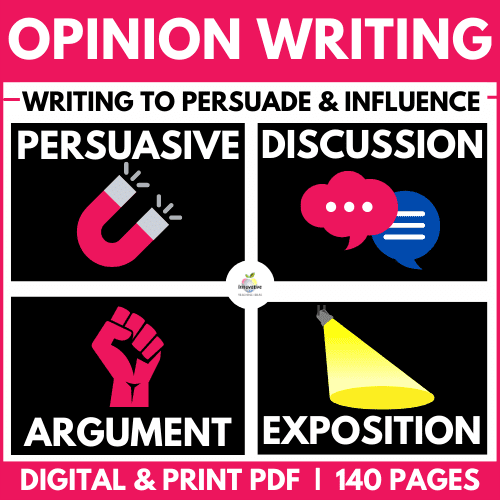
Teach your students to write EXCELLENT PERSUASIVE ESSAYS and master INFLUENTIAL WRITING SKILLS using PROVEN TEACHING STRATEGIES with this 140-PAGE UNIT.
ALL RESOURCES AND ASSESSMENT TOOLS INCLUDED – NO PREP REQUIRED.
30+ 5-star Ratings ⭐⭐⭐⭐⭐
OPINION WRITING CRITERIA TO ADDRESS
1. identify the audience: speak clearly.
Writing is about language and language is about communication; students should understand that we do not write in a vacuum. The purpose of an essay, letter, or any other form of writing we care to name, is ultimately to be read.
This means that it is essential that consideration be given to the character of the intended audience. Also, remind students that when they are writing, the reader is not privy to the inner workings of the writer’s mind. They must make their thoughts explicit in their writing and ensure that these thoughts are expressed in a coherent manner.
The student writer should always avoid making the assumption that the reader knows things that are not expressed explicitly in the writing.
2. Take a Stance: Stand Firm
From the very outset, the student should state their position boldly. More than that, they must stand firm in that opinion throughout the entirety of the piece.
Opinion writing is not about communicating a series of pros and cons or discussing at length the various related advantages and disadvantages, the place for that is not here. The opinion piece should open with a bold statement of opinion that is clearly expressed, and that opinion should be held unwaveringly and reinforced constantly throughout the text.
As with many other writing genres , employing a hook to grab the reader’s attention is good practice too. This hook can take the form of a quotation, an anecdote, a statistic, or even a joke. Whatever form the hook takes, it should reveal the writer’s take on things too.
To summarize, whatever the topic and however the student opens their opinion piece, they should ensure they express their opinion immediately and coherently. There should be no doubt in the reader’s mind as to where the student-writer stands on the issue.
3. Choose Appropriate Evidence: Back It Up
There is no doubt that subjectivity is an important aspect of opinion writing in general. That does not mean, however, that opinions do not need to be substantiated.
Your students will need to recognize that each and every statement of opinion will need to be supported by appropriate evidence. This will also help students to develop their critical reading skills as they will be able to better recognize when unsubstantiated claims are made by other writers. Opinions backed up with evidence help lead the reader along the writer’s pathways of thought; making the writing more convincing as a whole.
This evidence can take a wide variety of forms, ranging from personal anecdotes and quotations to statistics and references to scientific studies. Students should also always be encouraged to choose evidence that is broadly suited to the subject they are writing about.
4. Draw Conclusions: Wrap It Up
In the well-organized piece of opinion writing, as with many other types of extended writing, the writing should be structured in paragraphs. Paragraphs are essential elements of good writing organization.
Generally speaking, an opening paragraph gives way to body paragraphs. These body paragraphs, or development paragraphs, describe in more detail the ideas laid out in the initial opening paragraph by further exploring, explaining, and providing supporting evidence for each point.
The final concluding paragraph serves to close the circle by restating the central points in a closing endeavor to drive home the writer’s opinion.
5. A Word on Words
Writing is an art form. Attention to detail is important. But, it isn’t only important to look at the big picture things like structure, students should be encouraged to shift their focus from the text level down to the word and sentence levels too. In an opinion piece, strong, forceful verbs should be the order of the day. There is little space for passive forms when engaged in the construction of convincing arguments.
Things should be kept interesting too. Students should vary their sentence structures grammatically and in length. Variety is key.
As always in writing, editing should be emphasized. The editing process polishes the well-wrought opinion piece by putting the final gloss on the student’s work.
The OREO Opinion Writing Process Explained
As with all genres, there’s a lot to remember here and acronyms are a helpful way to commit these important things to memory. Luckily, few things can be easier to commit to memory than the name of a delicious cookie:
O – Opinion
R – Reasons
E – Evidence or Examples
O – Opinion (restated)
This memorable acronym will help students remember some of the main elements of opinion writing as outlined above. But, sometimes the hardest thing for students to do is to get the writing ball rolling.
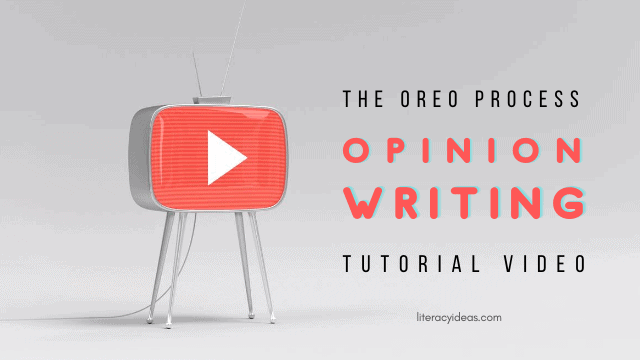
Opinionated Sentence Starters
Sentence starters provide students with great ways to kick-start their writing. Reminding students of simple ways of introducing opinion sentences can be helpful. Here are a few for ‘starters’ for starters:
● In my opinion…
● I think that…
● It seems to me that…
● It appears to me…
● I feel that…
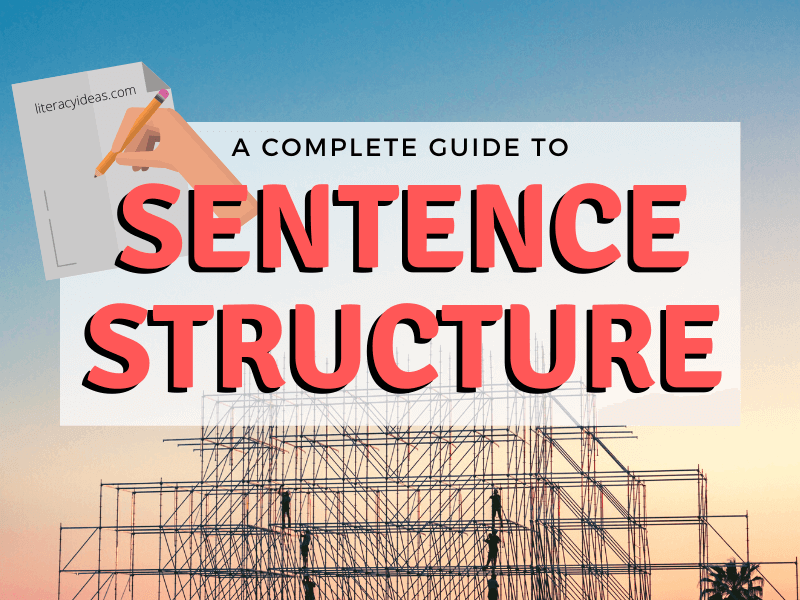
Once the student-writer has effectively expressed their opinion on a matter, they then will need to provide the reader with the reasons for why they think what they think. In an essay, these reasons will usually be found in the body paragraphs or development paragraphs. Normally, these paragraphs will explore a single reason each.
Some helpful sentence starters for introducing these reasons include:
● One reason I feel this way is…
● Evidence to support this can be found in…
● I believe this to evident in…
Opinion Writing Activities for Students
Students will certainly need practice completing sustained pieces of opinion writing, but some of the most valuable activities to help students evolve their opinion writing abilities barely require a pen to be put to paper.
While the following two activities do not require students to engage in extended pieces of writing, the activities below will assist students in grasping some essential concepts. These activities demonstrate good practice through modelling and also encourage dialogue, discussion, and debate as a means to strengthen opinion writing.
Activity 1: Opinion Writing – What Is It?
This exercise is a good follow-up to introductory work outlining the criteria of opinion writing as described above.
● Start by passing out copies of a piece of opinion writing you have selected to read with the class. Read the text aloud as the students follow along with their copy. The opinion text chosen can come from a wide range of genres, including advertisements, letters, editorials, essays, articles, or reviews.
● Assign students a talking partner and instruct students to take five minutes to identify the various criteria employed in the text. Encourage students to mark and annotate their copies of the text accordingly. You may even wish to supply students with a checklist compiled from the criteria mentioned previously in this article.
● As a whole class, discuss how successfully the text fulfills the criteria. What did the writer do well? What could they have done better? You can record their responses on the whiteboard.
The aim of this exercise is for students to hone their critical faculties while internalizing the criteria. This will reap rewards when the students later engage in their own extended opinion writing.
Activity 2: The Collaborative Case
This activity employs collaboration to help students build a stronger case for their opinion on a divisive issue.
● First, define the parameters of the exercise by presenting an either/or conundrum to the class. This doesn’t have to be overly controversial in nature, just stated in such a way that it forces the students to take one side or another. This could be stated simply as a choice, e.g. Dogs or cats? City or countryside? Beach or Mountains? Sweet or savory?
● Students then divide into two groups according to their stated preferences. In their groups, they then discuss and compile as many supporting reasons for their choice as they can come up with. As a group, they will discuss the relative merits of each reason, before agreeing on their top five.
● The groups then share their reasons in a debate format, using arguments and counter-arguments, leading into an open, free-ranging discussion.
The value of this exercise lies in the collaborative and ‘combative’ natures of the exercises. Just as our physical muscles can grow through resistance, so too can the strength and resilience of our opinions and arguments.
This activity can also be used as a lead-in to opinion writing as it works well as a prewriting preparation exercise. The complexity of the issue to be discussed and debated can easily be modified to suit the abilities of the students too.
A COMPLETE UNIT ON TEACHING FIGURATIVE LANGUAGE
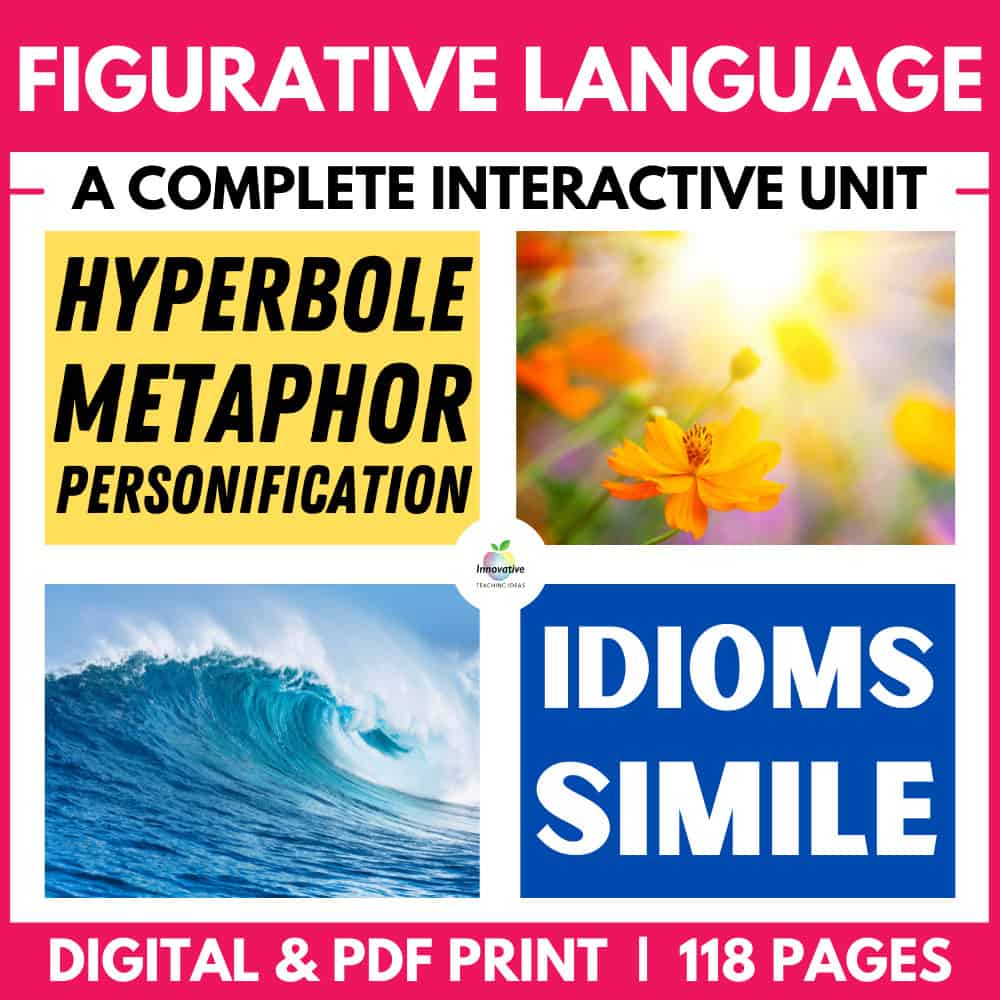
FIGURATIVE LANGUAGE is like “SPECIAL EFFECTS FOR AUTHORS.” It is a powerful tool to create VIVID IMAGERY through words. This HUGE UNIT guides you through completely understanding FIGURATIVE LANGUAGE .
⭐⭐⭐⭐⭐ (26 Reviews)
OPINION WRITING VIDEO TUTORIALS
These videos from teaching without frills are an excellent starting point for opinion writing. You can view the entire collection here.
The Wrap Up
Opinion writing is a higher-level skill that makes many demands on our students. It will challenge them to move beyond parroting the facts and figures they have acquired in their learning to formulate their own thoughts on topics they have learned about in class, or in the wider world beyond the school gates.
It will make demands on their skill as writers too. Our students must learn to mold and mechanically manipulate the language on the page to express their beliefs persuasively and effectively. To do this successfully, they will need ample opportunities to practice their writing craft. Once a firm understanding of the structures involved has been established, the student can become more fluid in their expression. They will add art and flair to their craft. But first, they must build on these firm foundations.
OTHER GREAT ARTICLES RELATED TO OPINION WRITING
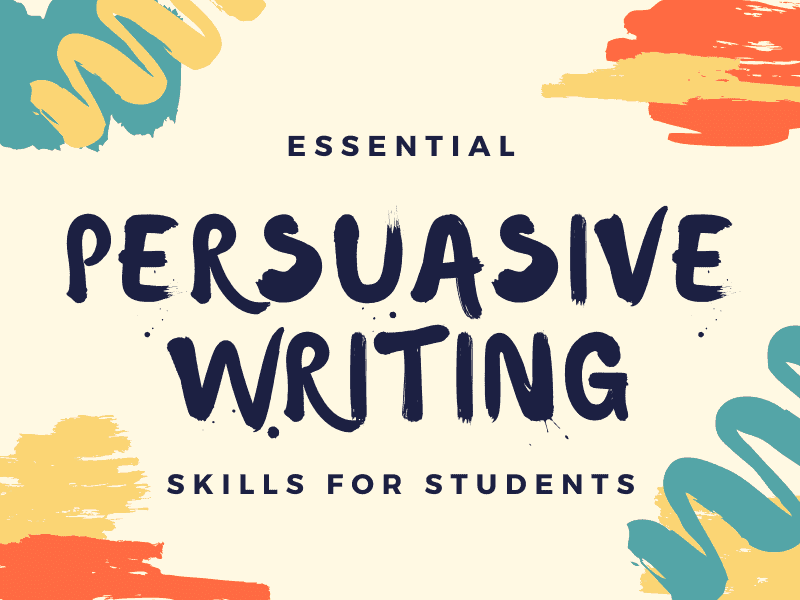
Top 5 Persuasive Writing Techniques for Students


5 Top Persuasive Writing Lesson Plans for Students and Teachers
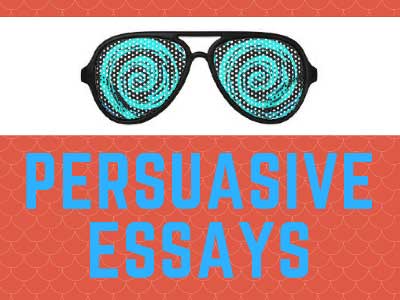
How to Write Perfect Persuasive Essays in 5 Simple Steps

23 Persuasive writing Topics for High School students

How to Write a Winning Debate Speech
- Efektywna nauka
- Języki obce
Rozprawka po angielsku – jak napisać rozprawkę „za i przeciw”

Czym jest rozprawka „za i przeciw” po angielsku?
Rozprawka po angielsku – o tym trzeba pamiętać.
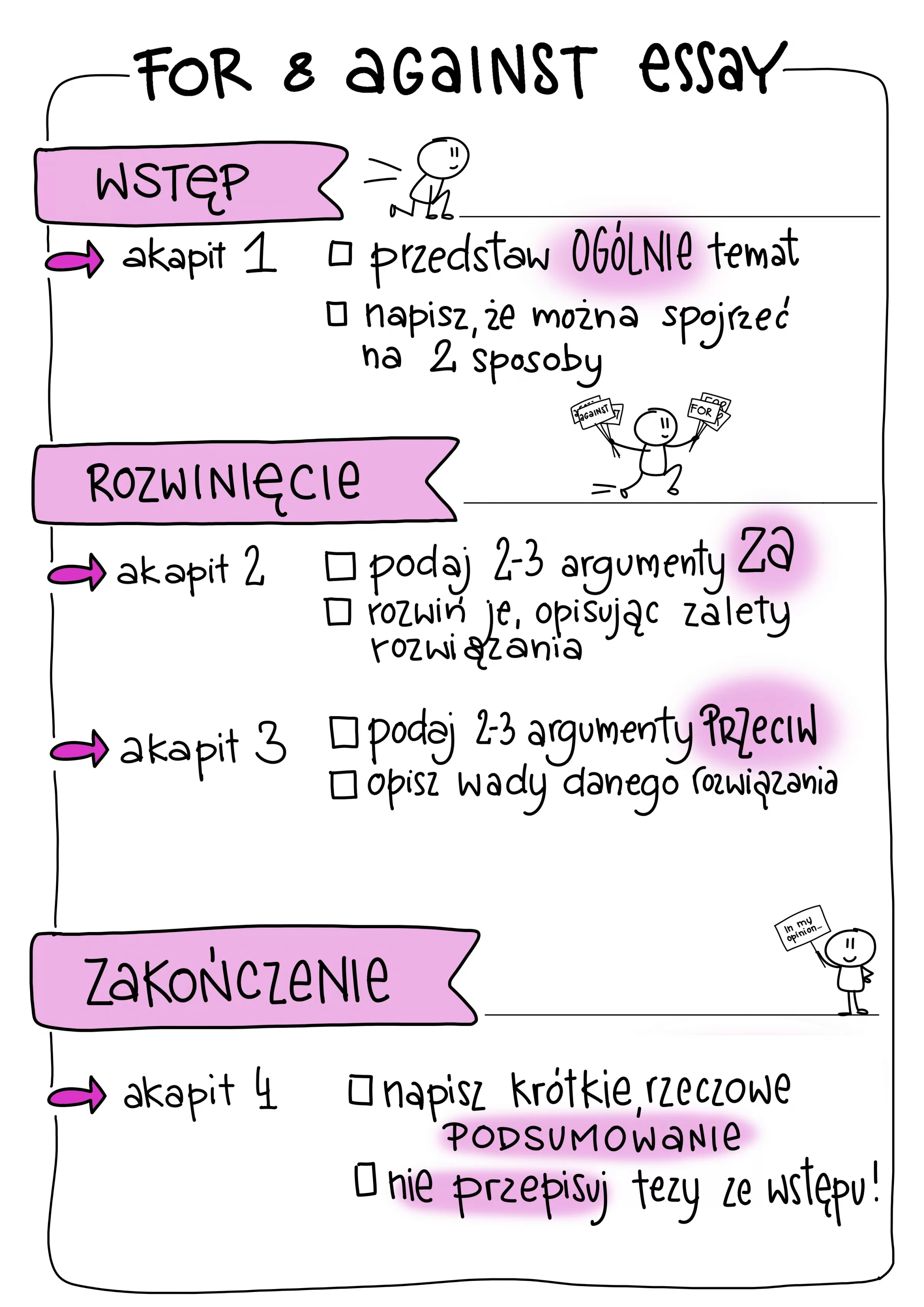
Rozprawka po angielsku – WSTĘP
Akapit 1 : Przedstaw ogólnie temat i napisz, że można na niego spojrzeć na dwa różne sposoby (dobre i złe strony; wady i zalety) – jest to tzw. teza dwustronna.
Wskazówka : Nie rozpisuj się – wystarczą 3–4 konkretne, zwięzłe zdania – koniecznie zaznacz, że widzisz zarówno wady, jak i zalety danego problemu. We wstępie możesz też zadać pytanie retoryczne, aby „podkręcić” zainteresowanie czytelnika 😉.
Rozprawka po angielsku – ROZWINIĘCIE
Akapit 2 : Podaj 2–3 argumenty ZA i rozwiń je, np. opisz zalety danego rozwiązania.
Akapit 3 : Podaj 2–3 argumenty PRZECIW i podaj wady danego rozwiązania.
Wskazówka : Koniecznie użyj charakterystycznych zwrotów i wyrażeń, które proponujemy niżej.
Rozprawka po angielsku – ZAKOŃCZENIE
Akapit 4 : Napisz krótkie, rzeczowe podsumowanie. Tylko tutaj możesz ewentualnie sformułować własną opinię.
Wskazówka : Najlepiej, jeśli podsumowanie będzie ujmowało temat z dwóch stron (nie może być jednak przepisaniem tezy ze wstępu).
Rozprawka for & against po angielsku – przydatne zwroty
Introduction – wstęp.
It is common belief that – Powszechnie uważa się, że
Experts claim that – Eksperci twierdzą, że
Most people agree that – Większość ludzi zgadza się, że
There are many pros and cons of – Istnieje wiele argumentów „za” i „przeciw”
PROS – argumenty „za”
To start with/To begin with – Na początek
One major advantage/pros of… is… – Jedną z głównych zalet… jest…
There is no doubt that – Nie ma wątpliwości, że
CONS – argumenty „przeciw”
On the other hand,… has its disadvantages. – Z drugiej strony,… ma swoje wady.
Opponents of... argue that… – Przeciwnicy… argumentują, że…
The cons are… – Wadami są…
Jak podać kolejne argumenty?
For example/For instance – Na przykład
Firstly/secondly/thirdly – Po pierwsze/drugie/trzecie
Furthermore/moreover – Ponadto
However – Jednakże
In addition – Dodatkowo
Finally – Ostatecznie, w końcu
CONCLUSION – zakończenie
All in all – Ogólnie rzecz biorąc (biorąc wszystko pod uwagę)
To sum it up/Summing up – Podsumowując
If you ask me…, I firmly believe that – Jeśli mnie zapytasz o…, to mocno wierzę, że…
Having considered both sides of the argument,… – Po rozważeniu obu stron sporu…
Rozprawka for & against po angielsku – ważne wskazówki
nie używać skrótów ( don’t – do not; isnt’t – is not, can’t – cannot itd.),
budować zdania złożone z użyciem zwrotów charakterystycznych dla rozprawki (patrz wyżej),
unikać zaimków „I, we” – gdyż wskazują na opinię osoby piszącej, lepiej wspomagać się stroną bierną – to język formalistów 😉,
pamiętać o formie graficznej – każdy akapit w osobnej linijce (najlepiej zostawić trochę miejsca, tzw. światło, między akapitami),
na zakończenie sprawdzić rozprawkę pod kątem poprawności i bogactwa językowego – na powtórkę ze słówek zapraszam cię do portalu Dlaucznia.pl. Upewnij się też, że budujesz złożone zdania i poprawnie używasz gramatyki (zagadnienia gramatyczne powtórzysz tutaj ).

Jak napisać zaproszenie po angielsku – wersja formalna i nieformalna
Zaproszenie na urodziny, imprezę albo wydarzenie w szkole? No problem! Pokażę ci, jak napisać zaproszenie po angielsku według najważniejszych zasad. Warto wiedzieć, jak skonstruować zaproszenie po angielsku, gdyż jest ono jedną z najpopularniejszych krótkich form pisemnych wymaganych w szkole (poziom podstawowy matury), ale przydatnych także w codziennym życiu.

Jak napisać dobrą rozprawkę z opinią ( opinion essay ) po angielsku
Rozprawka z opinią (opinion essay) to drugi najpopularniejszy typ rozprawki, którego możesz spodziewać się na maturze rozszerzonej albo na innym egzaminie z angielskiego. W rozprawce z opinią autor przedstawia swój punkt widzenia i popiera go silnymi argumentami. Gotowi? Piszemy!

Umiesz, bo rozumiesz!
Brzmi dobrze? Dla Ucznia to portal, dzięki któremu nauka w szkole średniej staje się prosta! Korzystaj z bazy lekcji, fiszek i quizów dla uczniów klas 1-3 i ucz się tak, jak lubisz najbardziej! Wybierz swój plan i odblokuj pełen dostęp już od 7 zł miesięcznie.

Zadania interaktywne – jak skutecznie uczyć się z dlaucznia.pl
Aby dobrze zorganizować wzajemną współpracę, trzeba szukać wsparcia m.in. w technologii i w dostępnych rozwiązaniach online. Bez wątpienia jednym z takich rozwiązań na miarę XXI w. jest genialna platforma – dlaucznia.pl !
Offer of the decade FLAT 20% off + sign up bonus of $20 Order Now
- [email protected]
- +14159918581
Files Missing!
Please upload all relevant files for quick & complete assistance.
Opinion Essays – Step-by-Step Instructions
Home / Blog / Write An Opinion Essay

Introduction
What makes an opinion essay truly compelling? Why do some essays resonate while others fall flat? The art of opinion writing is not just about sharing your thoughts; it is about persuading, informing, and engaging your readers. Today, we will learn all about crafting an impactful opinion essay.
So, how do you transform your opinions into powerful words that leave a lasting impression? Let us dive in and discover the keys to success in opinion writing.
What Is an Opinion Essay?
An opinion essay is a written work where an author expresses their viewpoint on a particular topic or issue. Unlike other essays that primarily rely on factual information and objective analysis, an opinion essay is inherently subjective, emphasizing the writer's beliefs, feelings, and perspectives.
Opinion essays are prevalent in various contexts, from academic assignments and journalism to blogs and editorials. They serve as a platform for individuals to express themselves, share their unique perspectives, and contribute to meaningful discussions on various subjects.
What Kind of Student Faces an Opinion Essay?
Let us explore the characteristics and educational contexts where opinion essays are commonly encountered:
1. High School Students:
High school students are frequently introduced to opinion essays as part of their English or language arts curriculum. These essay help students develop fundamental writing skills and the ability to express their viewpoints coherently. Opinion essays at this level often revolve around personal experiences, literary analysis, or current events, fostering critical thinking and communication skills.
2. College and University Students:
College and university students encounter opinion essays across various disciplines, from humanities and social sciences to natural sciences and engineering. In college, opinion essays become more sophisticated, requiring students to delve into scholarly research, cite academic sources, and formulate well-supported arguments. These essays are instrumental in promoting research skills, academic writing proficiency, and the ability to synthesize complex information.
3. Graduates and Postgraduates:
Graduate and postgraduate students frequently engage in opinion essays as part of their coursework and research activities. At this level, opinion essays may take the form of thesis proposals, research position papers, or responses to academic debates. These essays serve as essential paraphrasing tool for contributing to the scholarly discourse within their fields.
4. Law Students:
Law students encounter opinion essays in the form of legal memoranda, case briefs, or persuasive arguments. These essays hone their legal writing and argumentative essay topics skills.
In the legal profession, constructing well-reasoned opinions is vital, as lawyers often need to advocate for their clients' positions.
5. Journalism and Communication Students:
Students pursuing journalism or communication degrees frequently write opinion pieces, such as editorials and op-eds. Opinion essays in this context train students to effectively convey their thoughts to a broader audience while adhering to ethical and journalistic standards.
6. Political Science and Philosophy Students:
Political science or philosophy students delve into opinion essays as they explore complex political ideologies, ethical dilemmas, and philosophical debates. Opinion essays in these disciplines require students to analyze and critically evaluate different perspectives, fostering a deep understanding of complex issues.
7. MBA and Business Students:
MBA and business students encounter opinion essays in business ethics, strategic management, and decision-making courses. These essays sharpen their ability to make informed, ethical business judgments and communicate their rationale effectively.
8. ESL and Non-Native English Speakers:
Students learning English as a second language (ESL) or non-native English speakers may face opinion essays to enhance their language proficiency. Opinion essays help ESL students develop language skills while expressing their thoughts on diverse essay topics .
What Are the Requirements of an Opinion Essay?
Here are the key elements that should be present in an opinion essay:
1. Clear and Concise Thesis Statement:
Every opinion essay should start with a well-defined thesis statement. This statement is the heart of your essay, succinctly summarizing your main argument or viewpoint. It should be placed in the introduction, typically towards the end of that section.
2. Introduction:
- The introduction serves as the opening of your essay, capturing the reader's attention and providing essential context for the topic.
- Begin with a compelling hook, which can be a thought-provoking question, an interesting fact, a relevant quote, or a brief anecdote.
- Clearly present your thesis statement, outlining your opinion on the issue.
- Provide a brief overview of the points you intend to discuss in the essay's body, setting the reader's expectations.
3. Well-Structured Body Paragraphs:
- The body of your opinion essay should consist of several well-organized paragraphs, each dedicated to a specific aspect or supporting point related to your thesis.
- Start each paragraph with a clear topic sentence directly connecting to your thesis statement.
- Offer substantial evidence, examples, statistics, or personal experiences to support your viewpoint. Ensure the evidence is relevant and convincing.
- Maintain a logical flow between paragraphs, using transitional words and phrases to guide the reader seamlessly through your arguments.
4. Acknowledgment of Counterarguments:
- A robust opinion essay acknowledges opposing viewpoints or counterarguments. This demonstrates your ability to consider alternative perspectives and strengthens your own argument.
- Counterarguments can be addressed within the body paragraphs or in a dedicated paragraph where you present, discuss, and ultimately refute opposing views.
5. Conclusion:
- The conclusion should serve as the closing of your essay, summarizing your thesis statement and the main points presented in the body.
- However, avoid mere repetition of the introduction. Instead, offer a broader perspective, leaving the reader with something to contemplate, such as a thought-provoking idea, a call to action, or a suggestion for further exploration.
- Conclude your essay with a sense of closure, ensuring your final words leave a lasting impression.
6. Evidence and Examples:
Support your opinion with credible evidence, such as research findings, assignment expert opinions, or real-life examples. This lends credibility to your argument and makes it more persuasive.
7. Proper Citation:
If your essay includes external sources or references, ensure proper citation following the required citation style (e.g., APA, MLA, Chicago). Correct citation is essential to maintain academic integrity and prevent plagiarism.
8. Editing and Proofreading:
- Before finalizing your opinion essay, perform a thorough edit and proofread. Check for grammar and spelling errors, as well as clarity and coherence.
- Consider seeking peer, instructor, or professional editor feedback to ensure your essay is polished and error-free.
Opinion Essay Topics
Here are ten broad subject areas for opinion essay topics
1. Technology:
- The Impact of Artificial Intelligence on Employment
- Is Social Media Beneficial or Harmful for Society?
- The Ethics of Data Privacy in the Digital Age
- Should Technology Be Used in Education More Extensively?
- Is Online Learning as Effective as Traditional Education?
- The Role of Technology in Solving Environmental Issues
- Are Smartphones a Necessity or a Distraction in Daily Life?
- The Pros and Cons of Video Games for Children
- Is Technology Making Us More or Less Connected to Each Other?
- The Future of Work in a World Dominated by Automation
2. Education:
- Standardized Testing: Does It Accurately Measure Student Abilities?
- The Impact of Homeschooling on Children's Development
- Should Schools Implement Uniform Dress Codes?
- The Role of Arts Education in Academic Curriculum
- Are College Degrees Still Worth the Investment?
- The Benefits and Drawbacks of Online Education
- Should Schools Teach Financial Literacy as a Mandatory Subject?
- The Influence of Teachers on Students' Success
- Does Homework Enhance or Impede Learning?
- The Importance of Inclusive Education for Special Needs Students
3. Environment:
- The Responsibility of Individuals in Combating Climate Change
- Should Plastic Bags and Bottles Be Banned to Reduce Pollution?
- The Impact of Deforestation on Biodiversity
- Renewable Energy Sources vs. Fossil Fuels: Which is Better?
- Should Governments Implement Carbon Tax to Reduce Emissions?
- The Ethics of Animal Testing in Scientific Research
- Is Sustainable Living Achievable for Everyone?
- The Role of Urban Planning in Creating Eco-Friendly Cities
- Are Electric Vehicles the Future of Transportation?
- The Effectiveness of Recycling Programs in Reducing Waste
4. Politics and Government:
- The Importance of Voting in a Democracy
- Is Political Correctness Beneficial or Restrictive to Free Speech?
- Should Term Limits Be Imposed on Elected Officials?
- The Role of Social Media in Shaping Political Opinions
- Universal Healthcare vs. Private Healthcare: Pros and Cons
- The Impact of Immigration Policies on Society
- Should Affirmative Action Still Be Implemented?
- Is Political Polarization a Threat to Democracy?
- The Influence of Lobbying and Special Interest Groups on Politics
- Should the Voting Age Be Lowered or Raised?
5. Health and Wellness:
- The Pros and Cons of a Vegetarian or Vegan Diet
- The Impact of Fast Food on Public Health
- Should Vaccination Be Mandatory for All Children?
- The Benefits and Risks of Legalizing Marijuana
- The Role of Mental Health Education in Schools
- Is Healthcare a Basic Human Right?
- The Ethics of Genetic Engineering and Designer Babies
- The Impact of Stress on Physical and Mental Health
- Is Alternative Medicine a Valid Alternative to Conventional Medicine?
- The Influence of Advertising on Unhealthy Eating Habits
6. Social Issues:
- The Role of Social Media in Promoting Body Image Issues
- The Impact of Income Inequality on Society
- Is Capital Punishment Ethical or Inhumane?
- The Importance of Gender Equality in the Workplace
- Should Animal Testing Be Banned for Cosmetic Products?
- The Ethics of Euthanasia and Assisted Suicide
- The Influence of Celebrity Culture on Young People
- Is Online Bullying a Serious Threat to Mental Health?
- The Role of Government in Combating Homelessness
7. Economics:
- The Effects of Inflation on Consumer Purchasing Power
- Is Globalization Beneficial or Harmful to Developing Countries?
- The Impact of Minimum Wage Laws on Employment
- The Role of Cryptocurrency in Modern Finance
- Should Governments Provide Universal Basic Income?
- The Ethics of Corporate Social Responsibility
- The Pros and Cons of Trade Tariffs
- Is Economic Growth Sustainable in the Long Term?
- The Influence of Consumerism on Environmental Degradation
- The Role of Government Regulation in Preventing Financial Crises
8. Science and Technology Ethics:
- The Ethical Implications of Human Gene Editing
- Should Artificial Intelligence Have Legal Rights?
- The Use of Facial Recognition Technology: Privacy vs. Security
- The Dangers and Benefits of Biotechnology Advancements
- The Ethics of Cloning Animals for Human Consumption
- Is Privacy Invasion Justified in the Name of National Security?
- The Impact of 3D Printing on Intellectual Property Rights
- Should Autonomous Weapons Be Banned?
- The Ethical Considerations of Using CRISPR for Genetic Enhancement
- Is Space Exploration Worth the Cost and Environmental Impact?
9. Culture and Society:
- The Influence of Pop Culture on Young People's Behavior
- Should Cultural Appropriation Be Condemned or Celebrated?
- The Importance of Preserving Indigenous Languages and Cultures
- The Role of Music in Shaping Social and Political Movements
- Should Museums Return Stolen Artifacts to Their Countries of Origin?
- The Impact of Reality TV Shows on Society's Perception of Reality
- Is Online Dating a Positive or Negative Trend in Modern Relationships?
- The Ethics of Cultural Tourism and Its Impact on Local Communities
- Should Schools Teach More Diverse History and Literature?
- The Role of Literature and Art in Promoting Social Change
10. Ethics and Morality:
- The Ethics of Physician-Assisted Suicide for Terminal Patients
- Is Lying Ever Justified in Moral Dilemmas?
- The Role of Religion in Shaping Personal Morality
- The Ethics of Animal Rights: Should Animals Have Legal Personhood?
- Is Forgiveness a Virtue or a Weakness?
- The Moral Implications of Cloning Humans
- The Ethics of Nuclear Weapons and Deterrence
- Should Government Surveillance Be Permitted for National Security?
- The Role of Free Will in Determining Moral Responsibility
- Is It Ethical to Experiment on Animals for Scientific Research?
Opinion Essay Structure
Here is a breakdown of the essential elements:
1. Introduction:
- Hook: Begin with an attention-grabbing hook, such as a question, fact, quote, or anecdote, to engage the reader's interest.
- Thesis Statement: Present your clear and concise thesis statement. This statement is the foundation of your essay and encapsulates your main argument or opinion on the topic.
- Preview: Offer a brief overview of the main points or arguments you will discuss in the body of the essay. This sets the reader's expectations.
2. Body Paragraphs:
- Topic Sentences: Start each body paragraph with a clear topic sentence that relates directly to your thesis statement.
- Supporting Evidence: Provide evidence, examples, statistics, or expert opinions that support each argument. Ensure that the evidence is relevant and compelling.
- Transition Sentences: Use transitional words and phrases to guide the reader smoothly from one point to the next. This creates coherence and logical flow.
- Counterarguments: Address opposing viewpoints within the body of your essay, demonstrating your ability to evaluate different perspectives critically. This adds depth and persuasiveness to your argument.
3. Conclusion:
- Restate Thesis: Restate your thesis statement and summarize your main argument.
- Summarize Main Points: Summarize the key points or arguments you've presented in the essay's body.
- Broaden Perspective: Move beyond mere repetition of the introduction. Offer a broader perspective on the topic, leaving the reader with something to contemplate, such as the significance of your opinion or a call to action.
- Closing Thoughts: End with a thought-provoking closing thought, question, or statement that leaves a lasting impression on the reader.
Opinion Essay Examples
Here is an example for you -
The Impact of Social Media on Mental Health
Social media has become an integral part of our lives in today's digital age. While it offers various benefits, like staying connected with friends and accessing information, its influence on mental health has been a growing concern. This essay explores the impact of social media on mental well-being, arguing that while it has some advantages, it can also have detrimental effects.
Introduction:
The introduction provides a clear thesis statement: "This essay argues that social media has both positive and negative impacts on mental health." It engages the reader's interest with a hook, such as a startling statistic about social media usage or a relevant quote.
Body Paragraphs:
The body of the essay is divided into several paragraphs, each focusing on a specific aspect of the argument:
Positive Aspects: This paragraph discusses the positive impact of social media, such as fostering connections, providing support networks, and raising awareness of mental health issues. It includes examples and statistics to support these points.
Negative Aspects: Here, the essay delves into the negative effects of social media, including cyberbullying, social comparison, and addiction. Real-life examples and studies are cited to illustrate these harmful consequences.
Counterarguments: To address opposing viewpoints, the essay checker acknowledges that some studies suggest a limited negative impact of social media. However, it refutes these arguments with counter-studies and expert opinions, emphasizing the overall negative trend.
Conclusion:
The conclusion restates the thesis and summarizes the main points from the body paragraphs. It provides a balanced perspective by acknowledging the positive and negative aspects of social media's impact on mental health. The essay ends with a thought-provoking statement, encouraging the reader to consider their own relationship with social media and its effects on their well-being.
Additional Considerations:
The essay's clear topic sentences, evidence, and transitions between paragraphs maintain coherence. The essay follows a formal tone, uses proper grammar and citations, and avoids jargon. It provides a comprehensive overview of the topic while presenting a well-structured argument that engages the reader and encourages critical thinking.
Crafting top-notch and perfect opinion essay writing is not just about expressing your viewpoint; it is about constructing a persuasive and well-structured argument. You can effectively communicate your opinions by adhering to the fundamental elements of a clear thesis statement, an engaging introduction, well-supported body paragraphs, and a thought-provoking conclusion.
Remember to acknowledge opposing viewpoints, use evidence judiciously, and maintain a formal tone. Opinion essays are a powerful platform for sharing your thoughts, contributing to meaningful discussions, and refining your writing and critical thinking skills. You can craft opinion essays that resonate and persuade effectively with the right structure and approach.
Frequently asked questions
Q1. what is the key to a successful opinion essay.
The key to a successful opinion essay is a clear and compelling thesis statement that presents your main argument. Support your viewpoint with relevant evidence, maintain a logical structure, and acknowledge opposing perspectives.
Q2. How can I make my introduction engaging?
Start with a captivating hook, like a thought-provoking question or a surprising fact. Clearly state your thesis statement, and briefly preview the main points you will discuss.
Q3. What role do counterarguments play in an opinion essay?
Counterarguments demonstrate your critical thinking skills and strengthen your argument by addressing opposing viewpoints. You can acknowledge counterarguments within your essay and then refute them.
Q4. How can I ensure my opinion essay is well-structured?
Organize your essay with a clear introduction, body paragraphs focusing on specific points, and a conclusion summarizing your argument. Use transitional words for coherence.
Q5. Should I include personal experiences in my opinion essay?
Yes, personal experiences can enhance your essay's authenticity. However, ensure they are relevant to your argument and used as supporting evidence, not as the sole basis of your viewpoint.
Q6. How can I find credible evidence for my opinion essay?
Utilize reputable sources like academic journals, books, and expert opinions. Ensure your sources are recent and authoritative to bolster the credibility of your argument.
Q7. What is the difference between an opinion and a persuasive essay?
While both aim to persuade, an opinion essay primarily expresses your viewpoint. A persuasive essay focuses on convincing the reader to adopt your perspective through strong argumentation.
Q8. How can I maintain a formal tone in my opinion essay?
Avoid overly casual language and slang. Use proper grammar, spelling, and punctuation, and follow the conventions of academic writing, such as citing sources correctly.
Q9. Can I use personal anecdotes in my conclusion?
Yes, personal anecdotes can be effective in the conclusion to leave a lasting impression. Relate your personal experience back to your thesis or the broader implications of your opinion.
Q10. What is the most important aspect of revising my opinion essay?
The most crucial revision aspect is ensuring your essay is clear and well-organized. Check for logical flow between paragraphs, and edit for grammar, spelling, and punctuation errors.
Do you want to share?
You might also like.

Top 100 Persuasive Essay Topics/Ideas for Students

Discursive Essay Topics for Students

How to Write an Essay Introduction?

How to Write a Law Essay: Writing Guide with Examples

How to Choose Ideal Argumentative Essay Topics to Work On

PEEL Paragraph a Guide to Write a Perfect Essay

100 Effective Persuasive Essay Topics

How to Write a Descriptive Essay?- Guide with Examples

Who Am I Essay : How to Write it?
Leave a reply, place order.
Want Impressive Essay Help?
Submit your requirements here

-->Admin --> Published On Oct 3, 2023 | Updated on Oct 4, 2023

-->Admin --> Published On Sep 30, 2023 | Updated on Sep 30, 2023

-->Admin --> Published On Sep 26, 2023 | Updated on Sep 26, 2023

-->Admin --> Published On Sep 22, 2023 | Updated on Sep 26, 2023

-->Admin --> Published On Sep 5, 2023 | Updated on Sep 11, 2023
Assignment Help
Dissertation
Research Paper

-->Admin --> Published On Apr 18, 2019 | Updated on Aug 10, 2023

-->Admin --> Published On Sep 22, 2018 | Updated on Sep 12, 2023

-->Admin --> Published On Feb 13, 2019 | Updated on Aug 10, 2023

-->Admin --> Published On Apr 5, 2023 | Updated on Aug 10, 2023

-->Admin --> Published On Jun 22, 2020 | Updated on Aug 10, 2023
Subscribe Newsletter
You can place your order for free now. Simply submit your order and see what our writers can Subscribe to get regular update!
Thank you for commenting.
Thank you for subscribed newsletter.
Thank You For Commenting.
Get acquainted with the top essay helpers in the country and glide smoothly towards your academic goals with the necessary essay writing help online from US’s top professionals.
Want quick $20? Share your details with us.
Thank you for subscribing our newsletter
Have any Query? Contact with us
Opinion Writing: a Guide to Writing a Successful Essay Easily

An opinion essay requires students to write their thoughts regarding a subject matter. Relevant examples and explanations back their point of view. Before starting an opinion paper, it is important to study the definition, topics, requirements, and structure. Referring to examples is also highly useful. Perhaps you need help with our admission essay writing service ? Take a look at this guide from our dissertation writing service to learn how to write an opinion essay like an expert.
What Is an Opinion Essay
A common question among students is: ‘What is an Opinion Essay?' It is an assignment that contains questions that allow students to share their point-of-view on a subject matter. Students should express their thoughts precisely while providing opinions on the issue related to the field within reasonable logic. Some opinion essays type require references to back the writer's claims.
Opinion writing involves using a student's personal point-of-view, which is segregated into a point. It is backed by examples and explanations. The paper addresses the audience directly by stating ‘Dear Readers' or the equivalent. The introduction involves a reference to a speech, book, or play. This is normally followed by a rhetorical question like ‘is the pope Catholic?' or something along those lines.
What Kind of Student Faces an Opinion Essay
Non-native English-speaking students enrolled in the International English Language Testing System by the British Council & Cambridge Assessment English are tasked with learning how to write the opinion essays. This can be high-school or college students. It is designed to enhance the level of English among students. It enables them to express their thoughts and opinions while writing good opinion essay in English.
Get Your Opinion ESSAY READY TODAY!
We will write you a plagiarism-free opinion essay, with a title page, unlimited revisions, and bunch of other cool features included!
What Are the Requirements of an Opinion Essay?

Avoid Going Off-Topic: Always write an opinion essay within relevance to answer the assigned question. This is also known as ‘beating around the bush' and should not be included in any opinion paragraph as it may lower your grade.
Indent the First Paragraph: With most academic papers, opinion writing is not different. Therefore, it contains the rule of indenting the first line of the introduction.
A Well-Thought Thesis: The full thesis statement is a brief description of the opinion essay. It determines the rest of the paper. Include all the information that you wish to include in the body paragraphs
The Use of Formal Languages: Although it is okay to write informally, keep a wide range of professional and formal words. This includes: ‘Furthermore,' ‘As Stated By,' ‘However', & ‘Thus'.
Avoid Internet Slang: In the opinion paper, avoid writing using slang words. Don'tDon't include words like ‘LOL', ‘OMG', ‘LMAO', etc.
The Use of First Person Language (Optional): For the reason of providing personal thought, it is acceptable to write your personal opinion essay in the first person.
Avoid Informal Punctuation: Although the requirements allow custom essay for the first-person language, they do not permit informal punctuation. This includes dashes, exclamation marks, and emojis.
Avoid Including Contradictions: Always make sure all spelling and grammar is correct.
We also recommend reading about types of sentences with examples .
Opinion Essay Topics
Before learning about the structure, choosing from a wide range of opinion essay topics is important. Picking an essay theme is something that can be done very simply. Choosing an excellent opinion essay topic that you are interested in or have a passion for is advisable. Otherwise, you may find the writing process boring. This also ensures that your paper will be both effective and well-written.
- Do sports differ from ordinary board games?
- Is using animals in circus performances immoral?
- Why should we be honest with our peers?
- Should all humans be entitled to a 4-day workweek?
- Should all humans become vegetarians?
- Does a CEO earn too much?
- Should teens be barred from having sleepovers?
- Should everyone vote for their leader?
- The Pros & Cons of Day-Light Saving Hours.
- What are the most energy-efficient and safest cars of X year?
Opinion Essay Structure
When it comes to opinion paragraphs, students may struggle with the opinion essay format. The standard five-paragraph-essay structure usually works well for opinion essays. Figuring out what one is supposed to include in each section may be difficult for beginners. This is why following the opinion essay structure is something all beginners should do, for their own revision before writing the entire essay.
You might also be interested in getting more information about: 5 PARAGRAPH ESSAY

Opinion essay introduction
- Address the audience directly, and state the subject matter.
- Reference a speech, poem, book, or play.
- Include the author's name and date of publication in brackets.
- 1 or 2 sentences to make up a short description.
- 1 or 2 summarizing sentences of the entire paper.
- 1 sentence that links to the first body paragraph.
Body Paragraph 1
- Supporting arguments
- Explanation
- A linking sentence to the second body paragraph.
Body Paragraph 2
- Supporting argument
- A linking sentence to the third body paragraph.
Body Paragraph 3
- A linking sentence to the conclusion.
Conclusion paragraph
- Summary of the entire paper
- A conclusive sentence (the bigger picture in conclusion)
If you need some help, leave us a message ' write my essay cheap ' and we'll help.
Opinion Essay Examples
Do you need something for reference? Reading opinion essay examples can expand your knowledge of this style of writing, as you get to see exactly how this form of an essay is written. Take a look at our samples to get an insight into this form of academic writing.
Over the past, American popular culture has been strong in creating racial stereotypes. Images displayed through television, music, and the internet have an impact on how individuals behave and what individuals believe. People find their identities and belief systems from popular culture. Evidently, I believe that American pop culture has created racial stereotypes that predominantly affect other ethnic minorities. Analyzing the history of America reveals that African Americans have always had a problem defining themselves as Americans ever since the era of slavery. AfricanAmericans have always had a hard time being integrated into American culture. The result is that African Americans have been subjected to ridicule and shame. American pop culture has compounded the problem by enhancing the negative stereotypes ofAfrican American. In theatre, film, and music, African Americans have been associated with vices such as murder, theft, and violence.
The family systems theory has a significant revelation on family relations. I firmly agree that to understand a particular family or a member, they should be around other family members. The emotional connection among different family members may create functional or dysfunctional coexistence, which is not easy to identify when an individual is further from the other members. Taking an example of the extended family, the relationship between the mother-in-law and her daughter-in-law may be tense, but once they are outside the family, they can pretend to have a good relationship. Therefore, I agree with the theory that the existing emotional attachment and developed culture in the family is distinctively understood when the family is together.
Opinion writing is a form of academic paper that asks students to include their thoughts on a particular topic. This is then backed by a logical explanation and examples. Becoming more knowledgeable is a practical way to successfully learn how to write an opinion paper. Before writing anything, it is essential to refer to important information. That includes the definition, topics, opinion writing examples, and requirements. This is what turns amateur writers into master writers.
Feeling like you need some assistance with your essay? No matter what kind of writer you need, opinion or persuasive essay writer , our team consists of experts in all fields. Our college essay writing service helps those students who need an extra push when it comes to their assignments.
Need Qualified Essay Help?
Are you struggling with your opinion paper? Hit the button below to get writer's help. All your requests are processed fast.

Daniel Parker
is a seasoned educational writer focusing on scholarship guidance, research papers, and various forms of academic essays including reflective and narrative essays. His expertise also extends to detailed case studies. A scholar with a background in English Literature and Education, Daniel’s work on EssayPro blog aims to support students in achieving academic excellence and securing scholarships. His hobbies include reading classic literature and participating in academic forums.

is an expert in nursing and healthcare, with a strong background in history, law, and literature. Holding advanced degrees in nursing and public health, his analytical approach and comprehensive knowledge help students navigate complex topics. On EssayPro blog, Adam provides insightful articles on everything from historical analysis to the intricacies of healthcare policies. In his downtime, he enjoys historical documentaries and volunteering at local clinics.
Related Articles
%20(3).webp)

IMAGES
VIDEO
COMMENTS
Rozprawka z opinią po angielsku - ZAKOŃCZENIE (akapit 4) W zakończeniu rozprawki z opinią (opinion essay) musisz jeszcze raz podsumować swoje zdanie i potwierdzić opinię ze wstępu (spróbuj zrobić to innymi słowami). ZAKOŃCZENIE - przydatne zwroty. Taking everything into account…. - Biorąc pod uwagę wszystkie argumenty,….
Elementy składające się na rozprawkę typu opinion essay po angielsku. 1. Wstęp - wprowadzenie tematu, podanie tezy z własną opinią. Although zoos are very popular attractions for adults and children alike, they are very controversial. Many people argue that such places are useless and animals suffer physically and mentally.
Struktura opinion essay. Standardowa struktura eseju składa się z trzech akapitów: wstępu, rozwinięcia i zakończenia. O ile pierwszy i ostatni mają za zadanie najpierw wprowadzić, a potem podsumować wypowiedź, o tyle w rozwinięciu powinny znaleźć się jeszcze przynajmniej trzy paragrafy potwierdzające postawioną na początku ...
Opinion essay - przykład. Jako podsumowanie zamieszczamy poniżej przykładowy opinion essay, ... Jerozolimskie 123 A, 02-017 Warszawa, wpisana do rejestru przedsiębiorców prowadzonego przez Sąd Rejonowy dla m.st. Warszawy, XII Wydział Gospodarczy Krajowego Rejestru Sądowego, pod numerem KRS 673344, NIP 5252709433, kapitał zakładowy w ...
All in all, in my opinion, interacting with digital books will not replace the sensual satisfaction of reading a paper book - which does not need to be charged and which may be safely left in your backpack. 3 Match the highlighted phrases from the model essay with the headings below. • Expressing one's opinion:
Zostań patronem kanału: https://patronite.pl/EnglishIsFun Możesz też wesprzeć kanał przelewając dowolne środki z dopiskiem 'darowizna' na https://www.paypal....
Opinion essay vs for and against essay. Rozprawka (czyli za i przeciw) polega na przedstawieniu argumentów za i przeciw na zadany temat bez wyrażania własnej opinii. W rozwinięciu warto przedstawić dwa lub trzy argumenty za i przeciw i poprzeć je przykładami. Dopiero na koniec, po podsumowaniu tematu, możemy wspomnieć o naszej ...
Body Paragraphs. The body paragraphs of your good opinion essay should provide arguments and supporting examples to substantiate your opinion. Begin each paragraph with a distinct topic sentence and use credible sources to provide substantiation for your viewpoint with dependable data. Addressing counterarguments in your body paragraphs can ...
For and against essay - celem tego typu rozprawki jest przedstawienie jakiegoś zagadnienia w kontekście argumentów za i przeciw jakiemuś zjawisku. Pisząc ten typ rozprawki, należy przeprowadzić wywód zarówno za i przeciw danemu zjawisku i nie należy faworyzować żadnej ze stron. Opinion essay - celem tego typu rozprawki jest ...
An opinion essay has three parts: Introduction; Arguments or reasons that support your view. Conclusion; Introduction. Paragraph 1. Introduce the topic and give your opinion. Say whether you agree or disagree with the statement or question. It can be a good idea to use a question to grab the reader's attention. Check the two examples below:
Opinion essay - Jak pisać rozprawkę typu za lub przeciw.. Lekcja live z języka angielskiego dla uczniów przygotowujących się do matury, transmitowana na żywo...
Worksheets and downloads. An opinion essay - exercises 806.72 KB. An opinion essay - answers 284.99 KB. An opinion essay - essay 657.49 KB. An opinion essay - writing practice 187.62 KB.
OPINION WRITING CRITERIA TO ADDRESS. 1. Identify the Audience: Speak Clearly. Writing is about language and language is about communication; students should understand that we do not write in a vacuum. The purpose of an essay, letter, or any other form of writing we care to name, is ultimately to be read.
Dla ucznia Efektywna nauka Języki obce Jak napisać dobrą rozprawkę z opinią (opinion essay) po angielsku. Rozprawka z opinią (opinion essay) to drugi najpopularniejszy typ rozprawki, którego możesz spodziewać się na maturze rozszerzonej albo na innym egzaminie z angielskiego.
opinion essay templa. a template to show i. 1167 uses. izabela64. Opinion essay struct. This worksheet will . 438 uses. Kameza. Writing an opinion e. On this worksheet, s. 14401 uses. englishwithatea. Writing guide - An o. In this grammar guid. 1320 uses. Arianey. How to write an opin. Created for use with. 19046 uses.
Conclude your essay with a sense of closure, ensuring your final words leave a lasting impression. 6. Evidence and Examples: Support your opinion with credible evidence, such as research findings, assignment expert opinions, or real-life examples. This lends credibility to your argument and makes it more persuasive.
Learn to write a persuasive opinion essay in this educational YouTube video. Discover key steps: choosing a relevant topic, crafting a clear thesis statement...
Opinion essay introduction. Address the audience directly, and state the subject matter. Reference a speech, poem, book, or play. Include the author's name and date of publication in brackets. Thesis. 1 or 2 sentences to make up a short description. 1 or 2 summarizing sentences of the entire paper.
Here is an example: Top sports players are paid too much. Opinion: I disagree. Reason 1: Their careers are very short. Fact 1: their careers usually end in their 30's. Fact 2: sometimes, they are even shorter because of injuries. Reason 2: They lose their privacy. Fact 1: Constantly followed by journalists and fans.